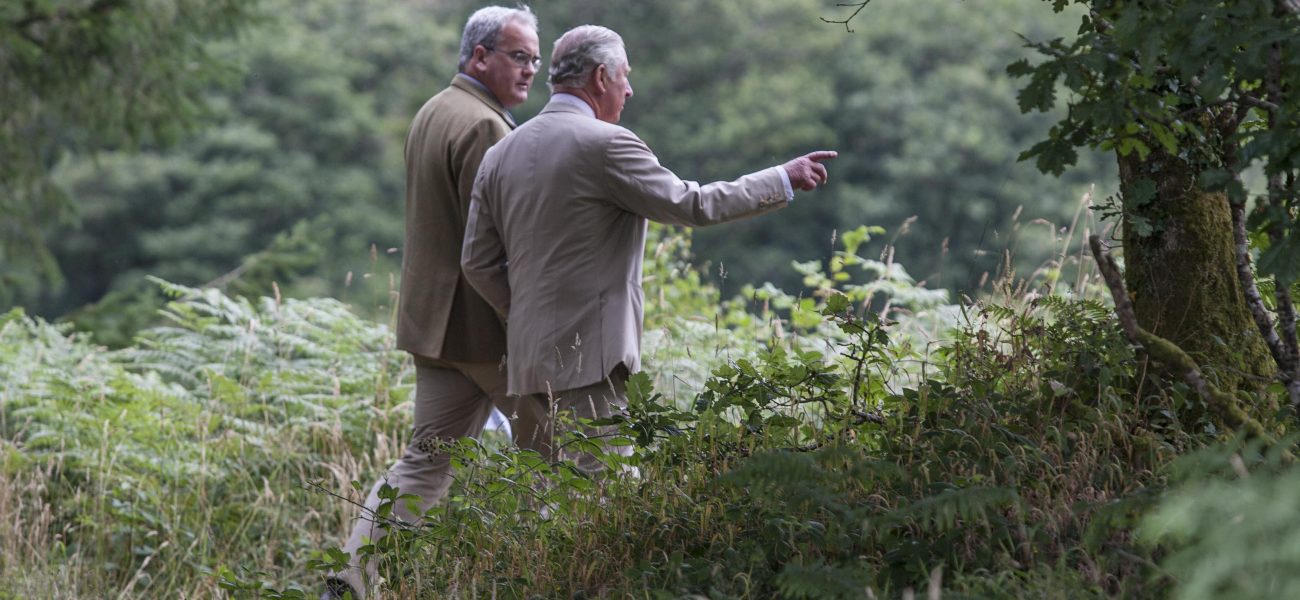
Reaching for Resilience
Geraint Richards has been Head Forester for the Duchy of Cornwall since 1996 and is now also Head Forester to His Majesty the King. The Duchy has around six thousand acres of woodland throughout the estate, but the main holdings are in Herefordshire and Cornwall.
The Cornish forests comprise around two and a half thousand acres (a thousand hectares), which means Geraint has many millions of trees in his care. There are more conifers in the Cornish forests where conditions favour their growth, while the Herefordshire forests are mainly broadleaves, mostly oak, ash and hazel.
In the face of climate change and the challenges it brings, the Duchy is implementing strategies to help its farms and forests adapt and survive. Geraint believes that diversity goes hand in hand with resilience. For the forests this means moving away from massive blocks of single species of timber crops which have proved particularly vulnerable to disease. Instead, new forests are planted to increase resilience by using a mix of species, maintaining a range of old and young trees, and varied species in the overstorey and understorey plants. Woods are managed to maintain continuous tree cover as opposed to clear felling.
This “closer to nature” approach maintains the woodland microclimate, provides shelter, protects the soil beneath and preserves the habitat for woodland creatures. A natural capital audit of all the Duchy farms is currently underway. This means evaluating every part of a farm in terms of soil, field patterns, watercourses, hedges, wildlife, trees, cultural heritage and so on. From this, a whole farm plan will be created, unique for each farm, outlining measures to improve resilience and sustainability to keep the farm productive and sustainable in the future. Measures may include replacing hedgerows, improving drainage or water retention, providing shade and shelter, improving soil, creating wildflower meadows, or replacing long-lost orchards. Almost without exception the farm plan will include planting more trees.
Timber from Duchy forests has multiple end uses according to its species and qualities. Some is used in fencing, either bog standard fence posts or ornamental fencing. The fences here at the Nursery are made from split chestnut grown in Herefordshire. Finer hardwoods are sought after for furniture making. Timber may be used in construction, either routine building or specialist structures. The frame and doorway of our new building is made from Duchy oak, and the building is clad in planks of larch or Douglas fir. Whatever its quality, function, or price every single piece of timber is locking up carbon.
Asked how gardeners can improve resilience in a domestic garden, Geraint has several recommendations. Firstly, think carefully about hard landscaping which increases run-off, reduces water available to the soil, and can lead to flooding. Think for nature, plant for pollinators, create a variety of habitats within the garden and plant trees. With only 3 conifers and around 30 broadleaves native to the UK, be open to planting non-native trees, but choose a tree which is suitable for your garden. Get your trees from a reputable supplier to ensure they are healthy, likely to thrive in our climate, and non-invasive.
The best time to plant a tree was 20 years ago, the next best time is today.
We now have a fantastic collection of ornamental and fruit trees available here at the Nursery. Ask for Rob or Nick, who will be more than happy to provide advice. Also, please pick up one of our free tree leaflets on your next visit.
Published originally in Houmout 5, October 2023.



